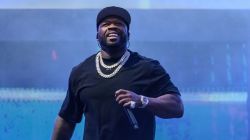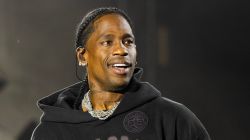If you talk about it, be about it.
This rule of Rap seems to be at the core of why we listen to the words, yet few conventions of the culture are broken more. Today’s rapper can fabricate a past, buy into a lifestyle, and teach the youth paper-soldier wisdom from a man who might have the tattoos and the cars, but never earned the stripes or walked the blocks.
Smoothe Da Hustler lived it as he talked it. In a career delayed by up north trips, and hindered by early ’90s label A&R’s fearing that hustling was the farthest thing from a Rap listener’s mind, the Brooklyn emcee took a slower, bumpier road to get on. Eventually signed by Profile Records, the Brownsville mainstay traveled the world, touring his critically-acclaimed 1996 debut Once Upon A Time In America, but due to label mergers, watched his Big Pun-assisted sophomore release collect dust on Arista‘s shelves.
Like Jay-Z, UGK and Snoop Dogg, Smoothe‘s street exploits were matched with lyrical skills. Along with blood brother Trigga Tha Gambler, Da Hustler pioneered a hard-nosed lyrical style that enriched the late ’70s Rap architects’ subject matter, with contemporary “Broken Language” flows, in an early effort to make Brooklyn the borough of the ’90s. If you asked almost anybody in the day, who one of the best lyricists was in Hip Hop, Smoothe Da Hustler was a name you would hear.
Thirteen years later, Smoothe Da Hustler, working on developing artists with friend Ice-T, is plotting his return. With the album tentatively titled Sir Vival, the Brooklyn emcee spoke to HipHopDX by phone from his SMG label offices. He’s got a song with brother Trigga, “Brooklyn Language,” and he’s at work with onetime D/R Period under-studies Tuneheadz.
Smoothe Da Hustler still talks about it, because he never stopped living it. It’s HipHopDX‘s new series, and these are our heroes.
HipHopDX: Let’s start with the new track, “Back Grinding.” Flowing along with the title, looking at the song…I know you’ve been putting out group music, the features with Ice-T and all, but as a soloist, what’s motivated you to put out solo material again?
Smoothe Da Hustler: Just the whole belief and just stickin’ to doin’ what I love doin’, which is being me. I like to push the envelope. I like to do different styles and flows. I don’t like to box myself in. After the “Broken Language” era, the game just became repetitive. Everybody, they picked up on that hustlin’ [subject matter], and just ran with it, and gave it one aspect…a definition of hustlin’ was that you’re making all this money, and you’re ballin’, and you’re rich, and you can buy anything and all that, which…my whole theory of it came from the struggle. You just put that extra [hustle] in it to get what you need to get out of it.
I was kind of fed up with the way they took hustlin’ and branded it as, “if you the hustler, you’re the big baller with all the money.” That was my fuel for the flame. But on a bigger scale, I just love makin’ music. It’s more of an outlet for me. My audio-diary. I had a few bumps and bruises along the way, but in order to [release it], that’s what I wanted to do it. That was my outlet.
“Back Grinding” truly speaks to my drive and my thought-process now. “Back Grinding,” all over again. I got 100% in.
DX: Looking back to the mid-’90s, “hustling” was different. Once Upon A Time In America dropped around the same time as Jay-Z’s Reasonable Doubt. A lot of people say that was Jay’s best album, and yet it’s one of his poorest in sales. That said, do you think in the ’90s, your career paid a cost from some of the subject matter and themes you were giving us? As that was hardly the norm then, as it’s become now…
Smoothe Da Hustler: Of course. Of course. It’s crazy, ’cause when I first started, I was shopping my stuff around. All the labels was like, “Hustlin’? I mean, what are you talkin’ about? Smoothe Da Hustler? I really don’t see this really taking off.” All along, I was saying, “Look. I know there’s a billion other cats like me, because I’m from it.” Getting validated from the hood was a big thing back in those times, ’cause you had to actually be doin’ [what you rhymed about]. It is what it is; it’s a business at the end of the day. You create a lane. Once the lane is open, it’s there to be milked.
[Once Upon A Time In America], I feel, was ahead of its time. I really thank Profile [Records] from the bottom of my heart. I thank them for believing in what I believed in and just saying, “Aiight. We gonna let this guy do what he’s gone do – and we gonna back him.” I thank them for that. On the flip-side of that, I would have loved for that record to have catapulted me on different levels, to where I could have actually took it a lot further. Just in my opinion, it went a different way.
My album [was very similar] to what Jay-Z [click to read] was talkin’ about on [Reasonable Doubt]. It was both growth, struggle, pain, all of that in one. Today [Hip Hop] is missing all of that.
DX: You mentioned Profile. You were somebody that had the hood behind you, but also, you weren’t appearing, to my knowledge, too many places before the first single and the album. Were there other labels expressing interest when it came time to try and get that deal?
Smoothe Da Hustler: Yeah. I went to Def Jam. At the time, I was writing for Foxy [Brown] when she was [known as] A.K.A. at the time. She was actually shopping some of the stuff I had wrote. [Def Jam] was loving her. I was like, “Damn, y’all lovin’ this stuff, but [not me?]” which was the same kind of mind-frame of hustlin’, but it was from a woman’s perspective, and it was more “gimme, gimme, gimme. I want. It’s about me.” They took more to that versus what I was actually trying to bring to the game.
Everybody bit, was like, “You’ve got to change this. You’ve got to change that. This will never work.” Every label turned me away, like, “Nah, we can’t even put this on the radio. How is this gonna work?” But me and [Trigga Tha Gambler] and the came who I was with – because I started independent with a group called Nexx Level, which was D/R Period, Rafiq Divine. The label turned us away, so we pressed up [“Hustlin'”] our first single [rapping], “My everyday lifestyle, ain’t nothin’ but a hustle / Gamblin’ / Slangin’” so we ran that through college [radio] and then college picked up, and then it slowly became what it was. Then the labels was still kind of “Eh.” So the only label that was really feelin’ me was Profile, and the A&R from Profile at the time was “Ill” Will Fulton.
Any show I would do, he would be there. It’d be the dirtiest spots, and this white boy is up in the spot like, “Yo!” Dude was bad. To this day, wherever this cat is, wherever he at, I hope he doing great, and I love him for believing in what I was doing, and the vision that we had. ‘Cause we was a small, independent team who was just on our own thing. He convinced the label, “Yo, let them do them. I’ve been to these guys’ shows; [Smoothe Da Hustler] got somethin’.” We rolled with him, and we convinced them to let us put “Broken Language” on the B-side, and boom! They was playin’ [the A-side] “Hustlin’,” and said, “Okay, this is nice. This is settin’ tone.” They heard “Broken Language” and was like, “Okay, well this sounds totally different.” And they gave it a chance. College radio loved it! [College listeners reacted well to the stuff from reading and art that were in my verses].
DX: Around the Nexx Level time, was D/R Period a recognizeable producer yet?
Smoothe Da Hustler: He had just got his feet wet with M.O.P. He just did the M.O.P. “How About Some Hardcore” – he actually did the whole [To The Death] album. During that album-making process, I would stop by him, because I was in the street, but I knew he was a producer. He was the producer of the hood. I would stop through, and he’d say, “Yeah, yeah. Do some songs.” I’d lace some songs, and then I got locked up. He [did] the M.O.P. album. He had a name, but he was just gettin’ on.
I just started exploiting his name, in the records – I would big up his name and throw his name around. I brought his name to the forefront; on the M.O.P. album, he was kinda in the background on that album. Big up to D/R! He’s workin’, doin’ whatever he’s doin’. I hope he hurries up and hits me with some more tracks. We spoke, but I haven’t gotten any new material from him.
DX: It’s funny to see you work with Ice-T 10 years after your debut. He’s one of the only direct influences I can see on your writing, as a “lyrical hustler.” Coming up though, who were you and Trigga’s influences?
Smoothe Da Hustler: You’re pretty on-point with the Ice-T thing. I always admired his style. He was always left-field. He’d be in the suits with the girl. I related to that on certain levels personally, because I had a few girlfriends, but I preferred one real pretty one. And when I’d go out, instead of rollin’ with 1,000 dudes, I would have her. I kind of felt that vibe.
At the same time, Rakim [click to read], [Big Daddy] Kane [click to read], Kool G. Rap [click to read], Freddie Foxxx [click to read], Edo G., Heavy D. Just Hip Hop in itself, it was just so fruitful at the time that I think everybody played a part in me, and shaping who I am. I used to love to read. I used to carry a notebook around. I was into poetry, but from my perspective – like a Donald Goines [poet]. I think all of that just helped influence what I wanted to bring to the game. I don’t try to be different, I just did what I wanted to do. I think that sets me apart from a lot of emcees. I don’t listen to the radio a lot. I’m really not up to date with who’s the hottest thing – I know you’ve got your T.I.‘s [click to read]. I love Eminem; I don’t know what [Relapse] [click to read] is gonna do, but I love him as a lyricist. I love his stuff. Talib Kweli [click to read]. I can go on [for days]. but I kind of stay in the shadow and just kind of do me. The sound was real grimey [too], and I give that to DR. He’s from the same neighborhood.
DX: Brownsville. Perfect segway. Between M.O.P. records, Boot Camp Clik records, your records, Brownsville, outside of just New York, or just Brooklyn, has always been represented as this “no man’s land.” It’s the Compton of the east coast, and a sacred hood to Hip Hop fans. Tell me about that hard environment coming up as an emcee in the ’90s…
Smoothe Da Hustler: Back then, coming up as an emcee, whatever you was talkin’ about, like I said, you really had to be doin’ it. People would call you out. It’s a thin line between reality and the illusion. To be an emcee in them days, I would be goin’ to the community centers in the projects, corner battles, and you’ve got your hustlers, your gangs, your drug-dealers, your stick-up kids – everybody’s standin’ around watching. Whoever you are in the street, or whatever respect you had, that counted. That had to have enough weight as the rhymes you was spittin’. So if you was a nobody, or you didn’t have as much respect in the street, and you was talkin’ all of it, in a cypher, somebody would call you out. Then after the cypher, they’d probably stick you up, and then exploit you. [Laughs] And then rap about it.
DX: Whether it’s the suits and notebooks or the delivery on “Broken Language,” how do you think you influenced Hip Hop for the next five-to-10 years after 1996?
Smoothe Da Hustler: I think we had a great impact. I think, even up to today,… I mean, I’ve sat and spoke with Grandmaster Caz and Grandmaster Melle Mel, a few of the pioneers, and they’ve told me, “Look, that ‘Broken Language’ is the lingo for Hip Hop. We sat and picked the song [apart] piece-by-piece, and this is what Hip Hop is. It’s braggadocious. It’s ‘this is what I can do.‘” That song, with no hook, with the intentions of just saying “this is what I am,” and trying to outdo each other, no gimmick, which became a gimmick afterwards – for people to mimick, but that was substantial. I looked up to these guys. And these guys was comin’ to my video shoot; I didn’t invite them. It was all love. Interacting with these guys now – Ice-T, another Rap legend, I’m blown away when he’s like [imitating], “Yo man, the reality in your raps, and the reality in your music touched me.” From a young G lookin’ up to an O.G., I’m like, “Wow!” It was a lot of self-validation for me, comin’ from these guys. I think that that’s what I bring. I’m convinced. I brought that part of the game – the all out, relentless side. After [me], it was DMX, all these other emcees, whether they made it or not. Hopefully, we’ll leave that type of legacy of “be hard, and you can still be lyrical, and you don’t have to follow whatever’s going on.”
DX: If you open up Ego Trip’s Book Of Rap Lists, you and your brother were one of the first family units in Hip Hop to be very serious. Like you mentioned, you’ve often seemed to try to outdo each other on records. Tell me about your family journey into Rap together.
Smoothe Da Hustler: [Trigga Tha Gambler] is my blood brother; we’re one year apart. When I started rappin’, he said, “Yo, I want to rap.” His first rap, I criticized it and I corrected it, as well as D.V. Alias Khryst. He was very tight with my brother; he would always be at my house. Rockin’ with my brother, we’d wake up and we’d play beats. We would just try to outdo each other. I stayed with it, and met DR, and started recordin’ the album and stuff, but I also told my brother, “Aiiight, now it’s time to step up. You gotta step it up.” The crazy part about it, it wasn’t like, “Aiiight, we gonna do this kind of record.” I would get the beat from DR, the “Broken Language” beat, and he just [ripped it]. We used to have this radio. We’d take it downstairs, into the hallway, and Khryst would come through, a few cats from Brownsville would come through. That would be like the studio/stage/Apollo/everything. We would just get it in. Just from that, we had it in the hallway, played the beat. The beat is blazin’, and Trig is goin’ in [freestyle]. We were both like, “Yo! Let’s start writin’ that shit!” Before you know it, that was done, and we laid it. It was our hidden jewel for a few months. In those months time, we would go at it.
I remember a show, we was in Canada. I was mad at him. We had a real fist fight – we brothers, so everybody knew not to jump in it, ’cause we’d turn and flip on them. We had a quick little fight, and we about to go on stage. This is like some movie shit, but I always recall this moment. We went onstage. I would bust a rhyme, and introduce him. Then he’d bust a rhyme. Man! That show was so fucking crazy, because he was really tryin’ to show me out. I wasn’t gonna let him show me out. Yo, it was just ridiculous. If somebody got that footage, they got one of the best shows, personally to me, in my life!
I’ve seen him destroy a lot of emcees. He brought Papoose in the game. He brought Papoose actually, down to our studio. We started recordin’ Papoose first.
DX: Before Roots of Evil with Kool G Rap?
Smoothe Da Hustler: Right. We had Papoose on a few joints. He’s a key, key part of the way I am.
DX: Have you guys been a support system in coming back to Rap over the years?
Smoothe Da Hustler: Oh, of course! We opened up a clothing store and a candy store, actually, in Virginia. We fell back. I had my situations with Profile. In my contract, instead of dropping me, they shipped me to Arista. Arista didn’t want to let me go, but then they didn’t want to pay me. They didn’t want to give me no bread for the new album, which was totally hard, mind you. It wasn’t no place up there for that kind of music. We just started doin’ the independent stuff.
At the independent stage, it does get stressful when you’re investing your own money in a business where it takes a lot more than a few G’s to pop a record off. It was stressful. We had good friends. We did meet Ice. I can consider him a real friend. At the time, he was doin’ a lot of tours and he was like, “Look, come jump on our tour. We’re doin’ a tour.” Instead of us havin’ our own set, or opening up for him, what he would do is he would go out, perform some of his set, and then say, “I’m a L.A. hustler, boom, but I connected with some Brooklyn hustlers. Some of y’all might know Smoothe Da Hustler.” The crowd would go crazy, and boom. To the average fan, it was a blast for them, ’cause they were getting the best of both worlds. They never expected it. It was real good for us, ’cause it kept us afloat, and it kept money in our pocket.
We did a deal with Tommy Boy that didn’t go through, but we ended up keeping the masters. Me and Trig, we did a Smith Brothers album. We wanted to get these things out. We did things to get money accumulated, besides music, and we [wanted to] go back at it. It took me two years to get out of my [Arista] contract. It’s crazy how labels will want to hold onto you, but don’t want to do nothin’ with you. I didn’t want to become another statistic, being trapped on a label.
DX: A lot of ’90s artists are releasing catalogue that we’ve never heard before. As you mention two shelved albums, any chance you’ll ever give fans a glimpse of what the labels couldn’t understand?
Smoothe Da Hustler: Of course! Right now, I have my own small imprint, SMG Entertainment. We have everything ready to go. I would really, really, really love a great distribution system, a support system. I know in order to get that, I have to make numbers; I have to make it pop. With that said, I know there’s a lot of cats out there that do have some type of power that can help me. I’m always down for help; I don’t turn it away. I would love to help get a platform to help put out these albums; I would love that. Go to the MySpace. Once in a while, I will throw an exclusive up. I’ll have SmootheDaHustler.com [soon] available for purchase. Anybody out there that feels what we doin’, serious inquiries, get at HipHopDX.com, and we can talk. [Laughs]
I got albums. I got a Trigga album that kind of went out there, 50/50 Gamble; we still got it! It’s fresh. We got all that. I even got an unreleased record that I did – me, Big Pun, Cormega, when he first came out of jail, and my guy Rhyme-Wrecka. That was on the album that Arista didn’t understand. [Laughs] It’s timeless.
DX: On your new album, you’ve got a record with Trigga called “Brooklyn Language.” Looking from “Broken Language” to “Brooklyn Language,” 15 years later, what’s kept your lyricism and that delivery so sharp?
Smoothe Da Hustler: Just not absorbing what’s been fed over 15 years. Like I said, I read a lot. I listen to a lot of beats. I listen to a lot of Rock. I’m influenced by my everyday, whatever-blows-my-way. I just don’t do what everybody’s doin’. When I listen to the radio, once in a blue [moon], it’s pretty much the same thing. If I heard it today, and I turned it on tomorrow, it’d be the same record. It all sounds the same. It’s too many lanes in Rap and in Hip Hop itself, and to be an emcee, [what I’m hearing is not enough]. You’d be surprised by what the mind can do when you’re actually trying to go against the machine. [Laughs]













real people do real things
u cant get realer than smoothe the hustler
i did security in brownsville back in the 90s and wore a swat bullet proof vest
with a 45 on my waistline
with my headset listening to broken lyrics
smoothe is the voice of the streets
a true veteran who practices what he preaches thanks for never selling out smoothe and keepin it thorough
reppin bk and the planet to the fullest
bought papoose in the game